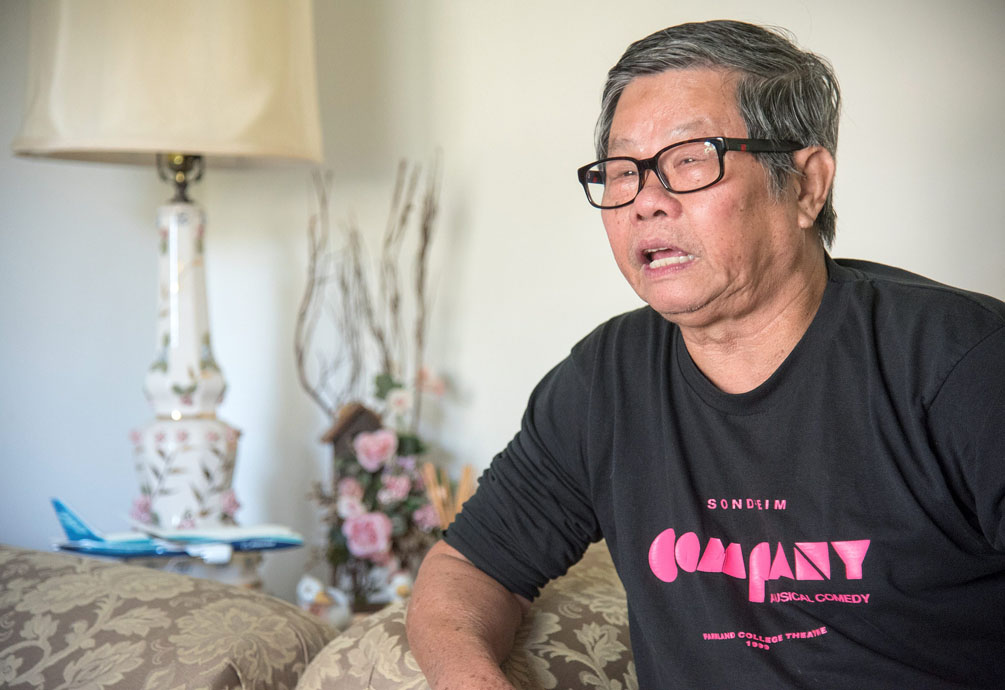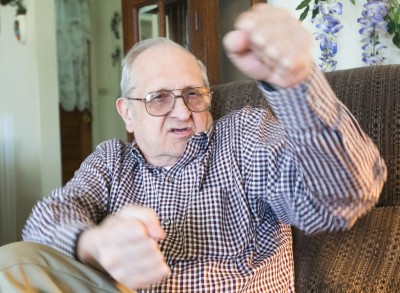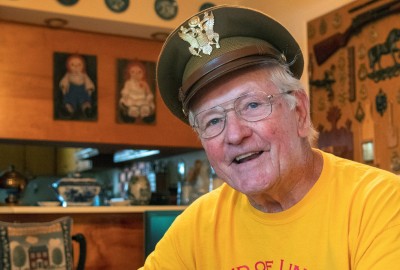Bon Bui
By Paul Wood

Photo By Stephen Haas/The News-Gazette
URBANA — Wounded six times in battle, Major Bon Bui spent 13 years starving in a prison and being “re-educated” in communist correctness — but never surrendered his love of America.
Trained by Marines at Quantico, he fought the North Vietnamese at the Tet offensive, and was given a last-ditch order to slow enemy troops closing in on Saigon so that the embassy could be evacuated.
His first wife died among the boat people who tried to escape Vietnam. Bui endured starvation — he lived on insects — and malaria to eventually find his way to America. Specifically, to Urbana, where his brother lived.
“I am grateful to America,” he said. “Thank you. The American people are the greatest in the world.”
His family fled North Vietnam in 1954 after the Geneva Convention split the country in half. Different family members used different routes to safety.
Bui then graduated from the Vietnamese National Military Academy — he calls it the equivalent of West Point — in 1966 as a second lieutenant. It looked then like the U.S.-South Vietnamese coalition had the north on the run.
But on New Year’s — Tet — in 1968, America was shocked to learn that NVA regulars and the Viet Cong had more power, ammunition and reserves than they been led to believe.
“The North Vietnamese surprised us because they violated an agreement to a cease-fire during the New Year,” he said.
He was injured during the Tet Offensive in early 1968.
He fought in battle after battle, wounded three times in a month — in the abdomen, eye and leg. Later, he’d receive other wounds, in battles in Hue and Quang Tri north of Hue. Each time, he returned to combat as soon as he recovered.
“Our forces were very poor, and we had to fight for years at a time, unlike American soldiers who had limited time here,” he said.
Bui was selected to be trained in the United States in the Marines from 1968 to 1970, first in San Antonio, Texas, then at Quantico, Va., then returned to South Vietnam.
The major continued to fight defending his country, sometimes alongside U.S. forces, until Saigon fell to the North Vietnamese in 1975, a battle in which his unit lost 200 men.
“I was ordered to defend Saigon at all costs,” he said.
The South Vietnamese defenders had no artillery, he said, and no tanks to beat back the well-supplied troops from the north.
“After 1972, when you used a bullet, you could get one to replace it,” he said of the light weapons used as they fought to defend Saigon.
With the U.S. out of Vietnam, Bui was a conspicuous target.
He became a prisoner of war and spent the next 13 years in the communist “re-education camps.”
Raised Roman Catholic, he said his faith kept him alive, even with malaria he still has. The days started at 4 a.m. and went to the end of the night.
“They treated us worse than dogs,” he said.
After being released from the camp, he tried to escape Vietnam by boat, but was captured and sent back to prison. His first wife was among the boat people who died at sea.
He was eventually granted refugee status by the U.S. in 1990, and moved with his family to Urbana.
He’s happily married and has three children. Bui worked 21 years at a fuel company.
“My family and I enjoy a peaceful life in America — no war, no fighting and enjoy freedom we never had before,” Bui said.
In retirement, he has returned to work as a crossing guard after turning 70, to keep watch over his family, he said with a smile.
Do you know a veteran who could share a story about military service? Contact staff writer Paul Wood at pwood@news-gazette.com.
Read more stories from local veterans:
 Ralph Hamilton
RANTOUL — When Viet Cong fighters infiltrated Ralph Hamilton’s camp near an extensive tunnel system, they had the opport …
Ralph Hamilton
RANTOUL — When Viet Cong fighters infiltrated Ralph Hamilton’s camp near an extensive tunnel system, they had the opport …
 Fredrick Holhubner
URBANA — To make sure his Army students knew how to put their protective gear on properly, Lt. Fredrick Holhubner had a …
Fredrick Holhubner
URBANA — To make sure his Army students knew how to put their protective gear on properly, Lt. Fredrick Holhubner had a …
 Eric Coy
SAVOY — Mortar attacks got to be a daily routine for Erik Coy, a Marine with two deployments to Iraq. Sgt. Coy, 36, went …
Eric Coy
SAVOY — Mortar attacks got to be a daily routine for Erik Coy, a Marine with two deployments to Iraq. Sgt. Coy, 36, went …